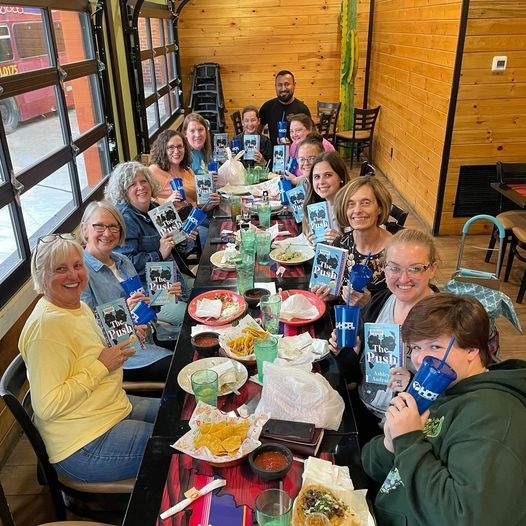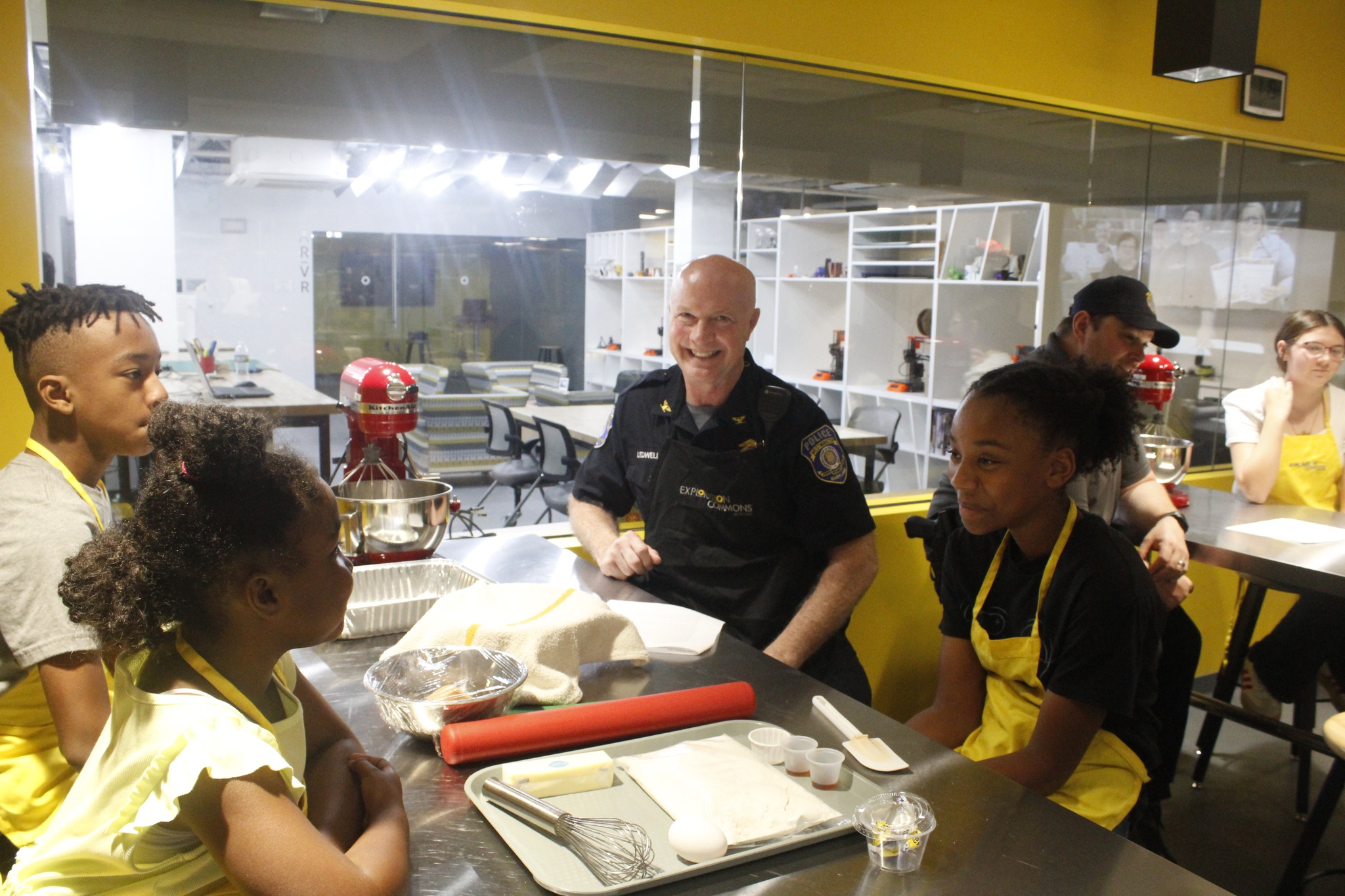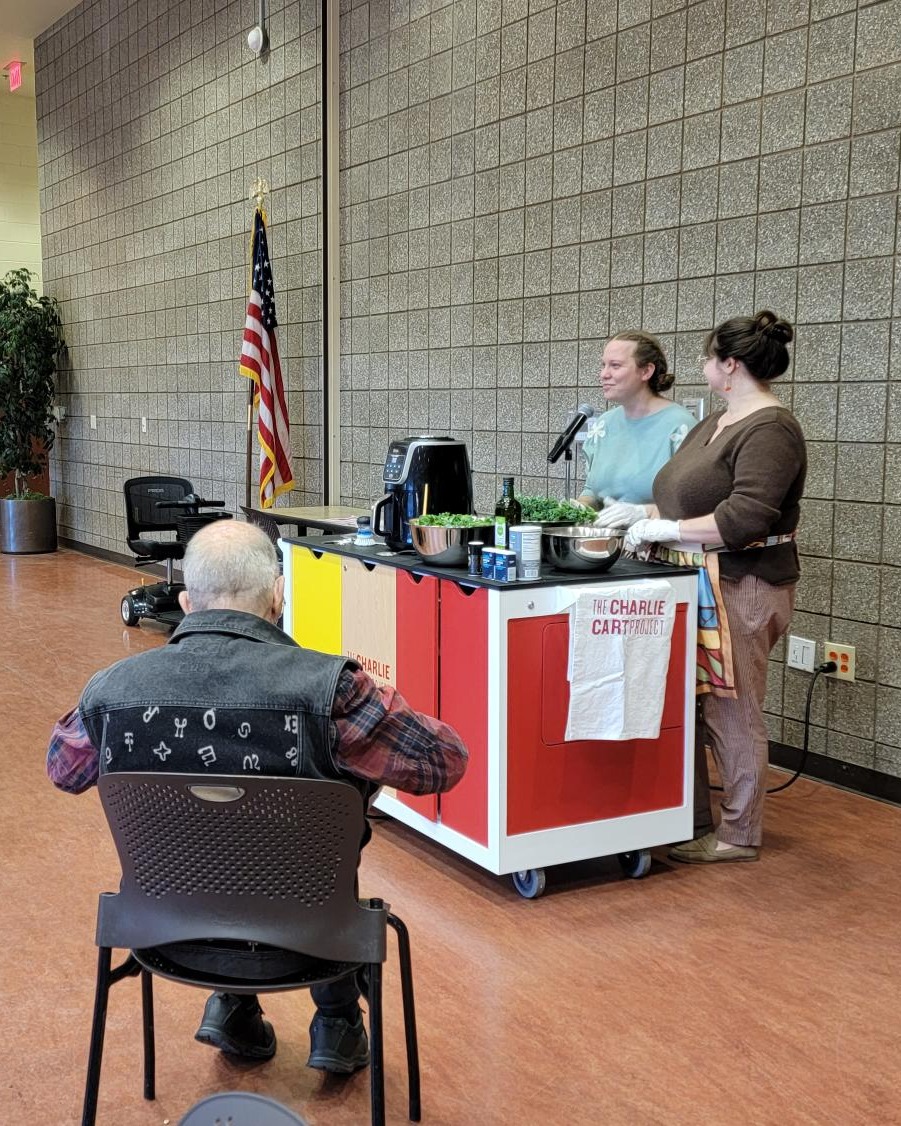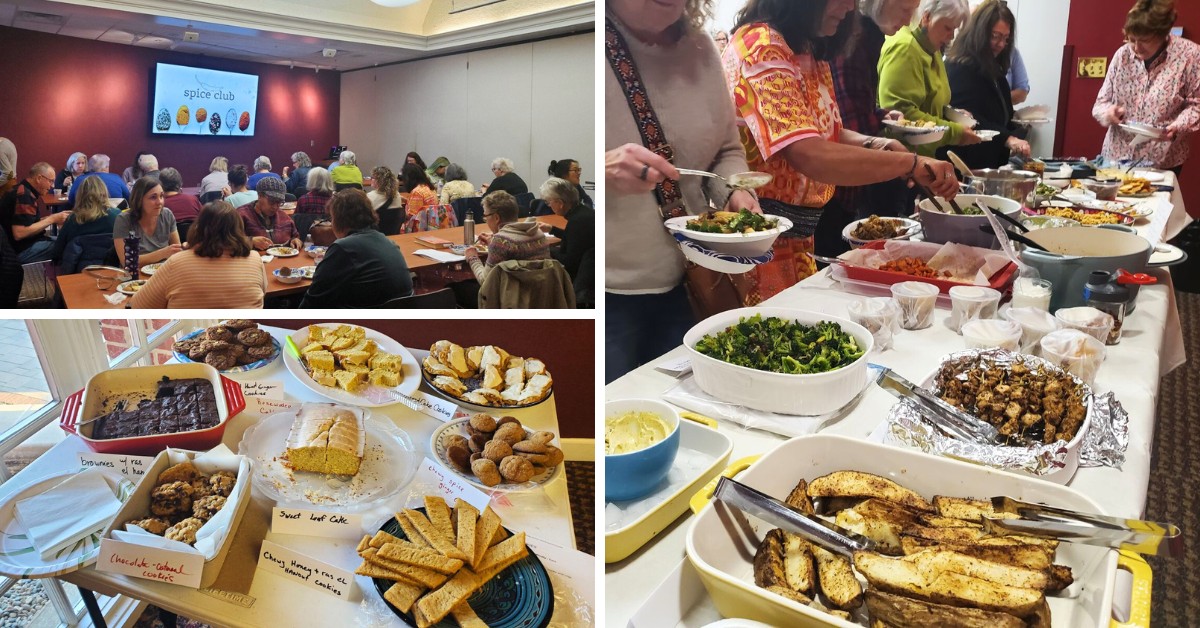Food for thought: Library kitchens and cooking programs
As community hubs, libraries can play an important role in promoting public health and wellness initiatives, including food and cooking literacy programs. But eating well involves more than just quality ingredients and culinary chops—joy, creativity, and community are all important ingredients in any good meal. Read on to learn how libraries are incorporating these elements in their food-related programming, and gather inspiration for your library’s next program.
Food and cooking program ideas
Create a food-themed book club

Food- and cooking-themed book clubs are a great way to blend cooks and books. These clubs can focus on anything from classic cookbooks and memoirs by famous chefs to novels where food plays a central role. Library staff can get creative by pairing monthly book selections with cooking demonstrations or potluck-style meetings where members bring dishes inspired by their readings.
Richland Community Library’s Cookbook Club features a different cookbook each month and a simple motto: “Choose a recipe. Make it. Bring it. Taste it.”
At Oglesby Public Library (Illinois), twenty- and thirty-somethings are invited to attend It’s Not Your Mother’s Book Club, a themed book club with conversation, food, and mocktails. Henderson County Public Library (Kentucky) hosts Plot Twist, a book club where you can sip delicious drinks, eat amazing food, and discuss the newest thriller.
And your book club doesn’t have to be limited to cookbooks—this Book Riot article features a list of foodie memoirs that can inspire your book club’s next meetup.
Host a cooking workshop or demo

Workshops and demos are some of the most popular ways libraries are getting their community members cooking. These events can feature local chefs, dietitians, or knowledgeable home cooks willing to share their expertise with participants. From basic skills to exploring international cuisines, these workshops cater to all skill levels, making cooking accessible and fun for everyone.
At Boston Public Library’s Nutrition Lab, Chef-in-Residence Glorya Fernandez offers programs to help patrons explore cooking techniques, cultural heritage, nutrition, and Boston history, all thanks to an anonymous donation.
In Madison, Wisconsin, four local women collaborated on the Library Takeover program to offer hands-on workshops designed to help participants learn about sustainable food pathways. Topics included meal prepping, blending herbal teas, juicing, and seed starting, with a focus on counteracting health and nutritional disparities that overwhelmingly impact Black and Indigenous community members.
And we can’t forget the baking fanatics! Carroll County Public Library (Maryland) offered a Baking with a Badge group cooking class, where kids had a chance to team up with local uniformed officers to make cinnamon cream cheese rolls.
Help kids and adults of all ages enjoy the joy of cooking

Public libraries are embracing the joy of cooking across all ages, offering tailored programs for kids, teens, and adults of all ages. From fun, hands-on baking classes for children to teen cooking competitions that stir up creativity, these programs are designed to engage every age group.
The Chop Chop Club at Hamilton East Public Library (Indiana) offers a monthly workshop for students in second through fifth grade. This popular class lets kids safely try their hands at new recipes using microwaves, toaster ovens, hot plates, and electric skillets.
Teen cooking clubs are a popular way to reach middle school and high school students. Newark Free Library (Delaware) hosts a monthly Teen Cooking & Culture Club, which gives participants the chance to explore food and cultures of different countries around the world. Recent featured countries included Ireland, Laos, and Costa Rica. For more ideas and inspiration for teen-centric food programs, check out this article on Teen librarian toolbox: The mini kitchen of your dreams for teen programming at your library.
Food-related programming is popular with adults and seniors, too. Beardsley Library (Connecticut) hosted a pasta and risotto cooking class as part of their adult summer program offerings. And Apache Junction Public Library (Arizona) uses their Charlie Cart mobile kitchen cart to bring food and cooking programs to community locations like senior centers.
Add a cooking collection to your Library of Things
Lending libraries offer a great way for community members to explore a new skill or hobby without the burden of purchasing new items, and culinary pursuits are no exception. Many libraries offer cooking kits and small appliances as part of their Library of Things. Pacific Grove Public Library (California) recently launched a new kitchen tools collection, including specialty cake plans, a Moroccan tagine, a tortilla press, an ice cream maker, and an instant pot.
In Eastern Oregon, a group of libraries partnered with the Oregon State University Extension to offer food preservation equipment to address food security issues. Participating libraries offered access to costly items like food dehydrators, vacuum sealers, and pressure canners, which can be prohibitively expensive for many households. People who borrow this equipment can also take home detailed equipment guides, recipes and information on safe practices for preserving food and processing produce or meat for preservation.

Start a spice club or spice library
Spice lending libraries and spice clubs are popular way for libraries to encourage their guests to explore new flavors. Erwin Public Library (North Carolina) offers a spice club, pairing their spice of the month with a cooking class or demonstration, like this one featuring smoked paprika. Attendees get a chance to sample the featured dish, learn about the history and uses of the spice, and take home two recipes and enough spices to recreate the dishes at home.
Plymouth District Library (Michigan) hosts a quarterly spice club community potluck, with the goal of learning about and appreciating different cultures through the lens of spices. Each event features a different region and a featured spice blend. Recent events included lavender and Ras El Hanout, a spice blend originating from North Africa.
For a passive programming option, many libraries set up a station for people to grab a spice packet to take home, along with recipe recommendations. Lincoln Public Library (Rhode Island) includes a flyer with fun facts and historical information about each spice, and even has a Pinterest board for all their featured spices. For a deeper dive, check out this WebJunction article to learn about Springvale Public Library’s spice club.
Create a library kitchen
Library kitchens are emerging as dynamic spaces where community members can gather to learn about food and nutrition. These fully equipped spaces allow libraries to host a wide range of food and nutritional education programs, from healthy cooking classes to workshops on budget-friendly meal planning. A few examples include the Culinary Center at the Green Hills Library Center (Missouri), Lorain County Public Library System Culinary Literacy Center (Ohio), and the Free Library of Philadelphia Culinary Literacy Center.
Addressing food insecurity
While this article focuses on culinary-related programs, it’s worth noting that food insecurity is a growing problem that touches nearly all communities. Libraries have a long history of helping keep their communities fed, from summer lunch programs to community pantries and more. Explore these articles and resources to learn more:
- Hunger-free libraries: Food pantries and fridges: This article explores how libraries are helping their community members stay fed with blessing boxes and community pantries.
- SNAP-Ed Library: The place for locating SNAP-Ed tools, success stories, and resources! Enter a search term below or use the filters to the left to find what you’re looking for.
- Tackling children’s food insecurity with community partners: Read about how Central Arkansas Library System partnered with community partners to help address food insecurity.
- Food Access and Seed Libraries in Rural Public Libraries: This WebJunction webinar features firsthand experiences with starting seed libraries and tips for getting started with a seed library of your own. Visit the webinar page for additional resources, including the webinar slide deck, learner guide, and recommended reading.
- Learn how libraries are helping address food insecurity through gardening and seed sharing programs in these articles: Growing library garden programs and Sow connection with seed libraries.
Culinary programs like the ones featured here are not just about teaching cooking skills; they’re about fostering community, encouraging lifelong learning, and promoting health and wellness for all ages. As these programs continue to grow, they highlight libraries’ evolving missions to nourish both the minds and bodies of the communities they serve.
If you're not yet a member of these active groups on Facebook (ALA Think Tank and Programming Librarian Interest Group), we encourage you to join and share your ideas, and find us on the WebJunction's Facebook page.
Additional resources and reading
Resources
- Let’s Move in Libraries: This project focuses on supporting healthy living in public libraries. Visit the website for a wealth of resources on building healthy communities. Explore program ideas, strategies for starting health-related projects in your library, stories, events, and more.
- USDA Foods Nutrition Education Resource Library: The USDA Foods Nutrition Education Resource Library provides free program-specific, nutrition education resources for FDPIR administering agencies.
- South Carolina Read Eat Grow: Library-based food literacy programs for all ages
- A Recipe for Reading: Culinary Literacy at Your Library: Programming Librarian webinar
Books and articles
- Shareable food articles: Explore community-led models of food production, processing, and consumption lead to healthier, more prosperous, and more sustainable communities.
- Cooking at the library: Public libraries online article
- Food programs at the library: Public libraries online library food programming article round-up
- The latest must-have for home cooks? A library card: America’s test kitchen article
- Food literacy programs teach more than cooking and nutrition: School Library Journal article
- Food literacy programs, resources, and ideas for libraries: ALA book
WebJunction resources
- Culinary Literacy: A Library Recipe for Cooking Up Literacy and Community: In this webinar recording, get inspired by the work of a 2016 LJ Mover & Shaker who is using a library kitchen to nourish a multitude of community literacies in Philadelphia.
- Spice of life: Adding variety to a Library of Things: Learn about Springvale Public Library’s spice library in this interview article.
- Food Access and Seed Libraries in Rural Public Libraries: This WebJunction webinar features firsthand experiences with starting seed libraries and tips for getting started with a seed library of your own. Visit the webinar page for additional resources, including the webinar slide deck, learner guide, and recommended reading.
- Check out additional reading and webinar recordings on food and libraries.
